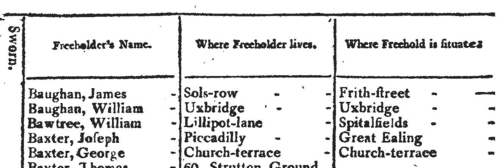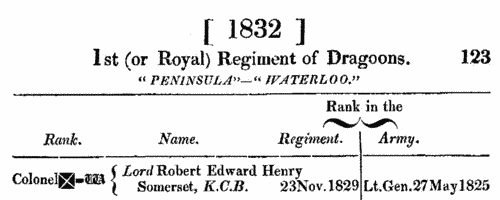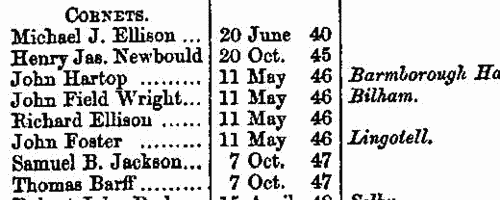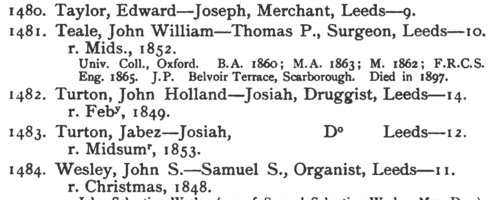Paulett Surname Ancestry ResultsOur indexes 1000-1999 include entries for the spelling 'paulett'. In the period you have requested, we have the following 43 records (displaying 31 to 40): Single Surname Subscription | | | Buying all 43 results of this search individually would cost £208.00. But you can have free access to all 43 records for a year, to view, to save and print, for £100. Save £108.00. More... |
These sample scans are from the original record. You will get scans of the full pages or articles where the surname you searched for has been found. Your web browser may prevent the sample windows from opening; in this case please change your browser settings to allow pop-up windows from this site.  Masters of Apprentices registered in Cambridgeshire
(1777) Masters of Apprentices registered in Cambridgeshire
(1777)
Apprenticeship indentures and clerks' articles were subject to a 6d or 12d per pound stamp duty: the registers of the payments usually give the master's trade, address, and occupation, and the apprentice's name, as well as details of the date and length of the apprenticeship. There are central registers for collections of the stamp duty in London, as well as returns from collectors in the provinces. These collectors generally received duty just from their own county, but sometimes from further afield. The indentures themselves can date from a year or two earlier than this return. (The sample entry shown on this scan is taken from a Bristol return. Each entry has two scans, the other being the facing page with the details of the indenture, length of service, and payment of duty.) IR 1/60PAULETT. Cost: £8.00.  | Sample scan, click to enlarge

| Deaths, Marriages, News and Promotions
(1796)
Death notices and obituaries, marriage and birth notices, civil and military promotions, clerical preferments and domestic occurrences, as reported in the Gentleman's Magazine. Mostly from England and Wales, but items from Ireland, Scotland and abroad.
PAULETT. Cost: £4.00.  | Sample scan, click to enlarge

| Freeholder voters in Middlesex
(1802)
A poll to elect two knights of the shire to represent the county of Middlesex, was held at Brentford 13 to 29 July 1802. The electors were the adult male freeholders of more than 40s per annum of real estate. This poll book lists the voters alphabetically by surname, giving christian name, abode, where the freehold was situate, the nature of the freehold (such as messuage, house, land, rent-charge &c.), the occupier's name, and whether the freeholder voted for William Mainwaring, George Byng or sir Francis Burdett. The entries are printed across facing pages, of which this sample shows part of a lefthand page. For each name indexed, the matching pair of scans is provided. This is the index to the freeholders.
PAULETT. Cost: £6.00.  | Sample scan, click to enlarge

| Deaths, Marriages, News and Promotions
(1813)
Death notices and obituaries, marriage and birth notices, civil and military promotions, clerical preferments and domestic occurrences, as reported in the Gentleman's Magazine. Mostly from England and Wales, but items from Ireland, Scotland and abroad.
PAULETT. Cost: £4.00.  | Sample scan, click to enlarge

| Officers of the British Army
(1832)
The annual Army List, published By Authority, first lists officers of the rank of major and above, by rank, and with dates of appointment to each successive higher rank; holders of crosses, crosses with clasps (with number of clasps indicated), medals, medals with clasps (with number of clasps indicated) are marked as such; and an ornate W indicates those officers actually present in any of the actions of 16, 17 or 18 June 1815 and therefore awarded the Waterloo Medal. For each officer in this section, the final column notes his then present or immediately former regiment and/or office, if any. Next, all the officers of the army are listed, down to the rank of ensign, by regiment or corps, giving rank, name, date of rank in the regiment, and date of rank in the army, with occasional further notes. Again, holders of medals are duly noted, as in the first list. For each regiment the paymaster, adjutant, quartermaster, surgeon and assistant surgeons are named, as well as the civilian agent; and the regimental motto, battle honours, and colours of the facings and lace of the dress uniform are stated. After the British regiments of the line, the officers of the West India infantry, the Ceylon rifles, the Royal African Colonial Corps, the Cape Mounted Riflemen, the Royal Newfoundland Veterans, and the Royal Malta Fencibles are given; then the officers of the garrisons and other military establishments in Great Britain, Ireland, North America and Gibraltar (with Malta); the Royal Artillery; Commissariat Department; Medical Department; Chaplains' Department; officers retained on full pay; officers on British half pay; and officers on Foreign half pay (including the German Legion, the Brunswick Cavalry, the Brunswick Infantry, Chasseurs Brittaniques, Corsican Rangers, Dillon's Regiment, the Greek Light Infantry, Malta Regiment, Meuron's Regiment, Roll's Regiment, Sicilian Regiment, Watteville's Regiment, and the York Light Infantry Volunteers).PAULETT. Cost: £4.00.  | Sample scan, click to enlarge

|  Persons of standing recommending London police recruits
(1830-1842) Persons of standing recommending London police recruits
(1830-1842)
The Metropolitan Police Register of Joiners (MEPO 333/4) lists policemen joining the force through to 31 December 1842 (to warrant number 19892). The register is alphabetical, in so far as the recruits are listed chronologically grouped under first letter of surname. It is evidently a continuation of a similar earlier register, not closed until its alphabetical sections were filled: consequently, there are no entries in this register for the initial letters N, O, Q, U, V, X, Y or Z; and the sections of this register start at different dates - A 18 April 1840 (warrant number 16894); B 11 December 1830 (5570); C 7 September 1830 (4988); D 27 May 1833 (8445); E 15 December 1838 (14476); F 30 March 1832 (7372); G 1 December 1835 (11,184); H 25 April 1832 (7457); I and J 13 February 1837 (12449); K 2 January 1838 (13457); L 3 October 1834 (9905); M 15 November 1832 (7999); P 4 October 1831 (6869); R 4 September 1837 (13021); S 30 March 1835 (10366); T 6 April 1840 (16829); W 30 December 1833 (9096). The register gives Date of Appointment, Name, Number of Warrant, Cause of Removal from Force (resigned, dismissed, promoted or died), and Date of Removal. Those recruits not formerly in the police, the army, or some government department, were required to provide (normally) at least two letters of recommendation from persons of standing, and details of these are entered on the facing pages: the names in these are indexed here (the police recruits are indexed separately and not included here). Recruits transferred from other forces or rejoining the force did not normally need recommendations - in the latter case, former warrant numbers are given - but some recommendations are from police inspectors, even other constables. Recruits coming from the army sometimes have general military certificates of good conduct, but most often have a letter from their former commanding officer; recruits recommended by government departments (most often the Home Office) similarly have letters from the head of department. But the great majority of the names and addresses in these pages are of respectable citizens having some sort of personal acquaintance with the recruit. Where more than two recommendations were provided, the clerk would only record one or two, with the words 'and others'. Tradesmen are sometimes identified as such by their occupations; there are some gentry. Although the great bulk of these names are from London and the home counties, a scattering are from further afield throughout Britain and Ireland. PAULETT. Cost: £8.00.  | Sample scan, click to enlarge

| Deaths, Marriages, News and Promotions
(1845)
Death notices and obituaries, marriage and birth notices, civil and military promotions, clerical preferments and domestic occurrences, as reported in the Gentleman's Magazine. Mostly from England and Wales, but items from Ireland, Scotland and abroad.
PAULETT. Cost: £4.00.  | Sample scan, click to enlarge

| Yeomanry and Militia Officers
(1850)
The Royal Military Calendar lists officers of the Yeomanry Cavalry and the Militia, the armed forces supporting the civil power in Britain and IrelandPAULETT. Cost: £6.00.  | Sample scan, click to enlarge

| Gentry in London
(1856)
The Post Office London Directory for 1856 includes this 'Court Directory', listing alphabetically by surname and christian name the upper class residents of the capital with their postal addresses. 'In order to afford space for the addresses, the abbreviation "esq." for esquire has no longer been appended to each name in the Court Directory. It should be understood that such should be added to the name of every gentleman in the following pages to which no inconsistent addition is affixed.' Decorations, honours &c. are generally given. Some gentlemen appear who are also listed (as professional men, &c.) in the commercial section. Those with second residences in the provinces usually have the country address given as well.PAULETT. Cost: £4.00.  | Sample scan, click to enlarge

| Boys entering Leeds Grammar School
(1876)
The admission books for Leeds Grammar School from 1820 to 1900 were edited by Edmund Wilson and published in 1906. The series of registers is almost complete for the period, there being in addition admission registers for the Lower (or Commercial) Department from 1856 to 1865, and lists of boys in the school in 1856, and in the Commercial Department in 1861. The entries are arranged by date or term of admission: a sequential number is given first, then surname, christian name, and, after a dash, father's christian name, occupation, and address; another dash, and then the age of the boy at admission, and often his year of leaving (with the abbreviation r. for 'removed' or 'left'). r.* means left without notice; (o) or S. or Stranger or Foreigner indicates a boy not on the foundation. The editor was unable to divine the meaning of the abbreviation (Q) or the asterisks prefixed to most entries in 1856 to 1860, but dutifully copies them into the text. In smaller type he then proceeds, where possible, to add some information about the boy's subsequent career.PAULETT. Cost: £4.00.  | Sample scan, click to enlarge

|
Research your ancestry, family history, genealogy and one-name study by direct access to original records and archives indexed by surname.
|













